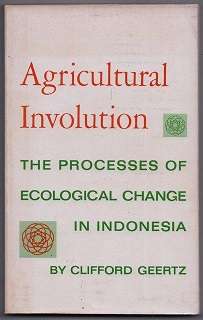Agricultural Involution: The Processes of Ecological Change in Indonesia

Agricultural Involution: The Processes of Ecological Change in Indonesia is one of the most famous of the early works of Clifford Geertz. It principal thesis is that many centuries of intensifying wet-rice cultivation in Indonesia had produced greater social complexity without significant technological or political change, a process Geertz terms "involution".
Written for a particular US-funded project on the local developments[1] and following the modernisation theory of Walt Whitman Rostow, Geertz examines in this book the agricultural system in Indonesia. The two dominant forms of agriculture are swidden and sawah. Swidden is also known as slash and burn and sawah is irrigated rice paddy. The geographical location of these different types is important. Sawah is the dominant form in both Java and Bali where nearly three quarters of Indonesia's population live and swidden more common in the less central regions. Having looked at the agricultural system the book turns to an examination of the systems historical development. Of particular note is Geertz's discussion of what he famously describes as the process of "agricultural involution". This is his description of the process in Java where both the external economic demands of the Dutch rulers and the internal pressures due to population growth led to intensification rather than change. What this amounted was increasing the labour intensity in the paddies, increasing output per area but not increasing output per head.
This was politically the most controversial text of Geertz as the Modjokuto project was a CIA funded project for CENIS at MIT.[2] However, in an interview to David Price he asserts that he was not involved with the political side of the project.[3]
Late in his career, Geertz reflected that the book had become an "orphan," widely read and criticized without reference to his larger body of work.[4]
References
- Agricultural Involution: The Processes of Ecological Change in Indonesia. By Clifford Geertz. Berkeley and Los Angeles, California: University of California Press, 1963.[5]
- Notes
- ↑ Reyna, Steve (1998). "Right and Might: Of Approximate Truths and Moral Judgments"". Identities. 43 (3–4): 431–465.
- ↑ Price, David 2003. "Subtle Means and Enticing Carrots: The Impact of Funding on American Cold War Anthropology." Critique of Anthropology 23(4):373-401.
- ↑ Price, David 2003. "Subtle Means and Enticing Carrots: The Impact of Funding on American Cold War Anthropology." Critique of Anthropology 23(4):373-401.
- ↑ Geertz, Clifford (1991). "Change without Progress in a Wet Rice Culture" (PDF). Current Contents. 12: 8.
- ↑ Smail, John R. W. (1965) Review of Agricultural Involution: The Process of Ecological Change in Indonesia. By Clifford Geertz. University of California Press, Berkeley and Los Angeles, 1963. , Journal of Southeast Asian History (1965), 6: 158-161